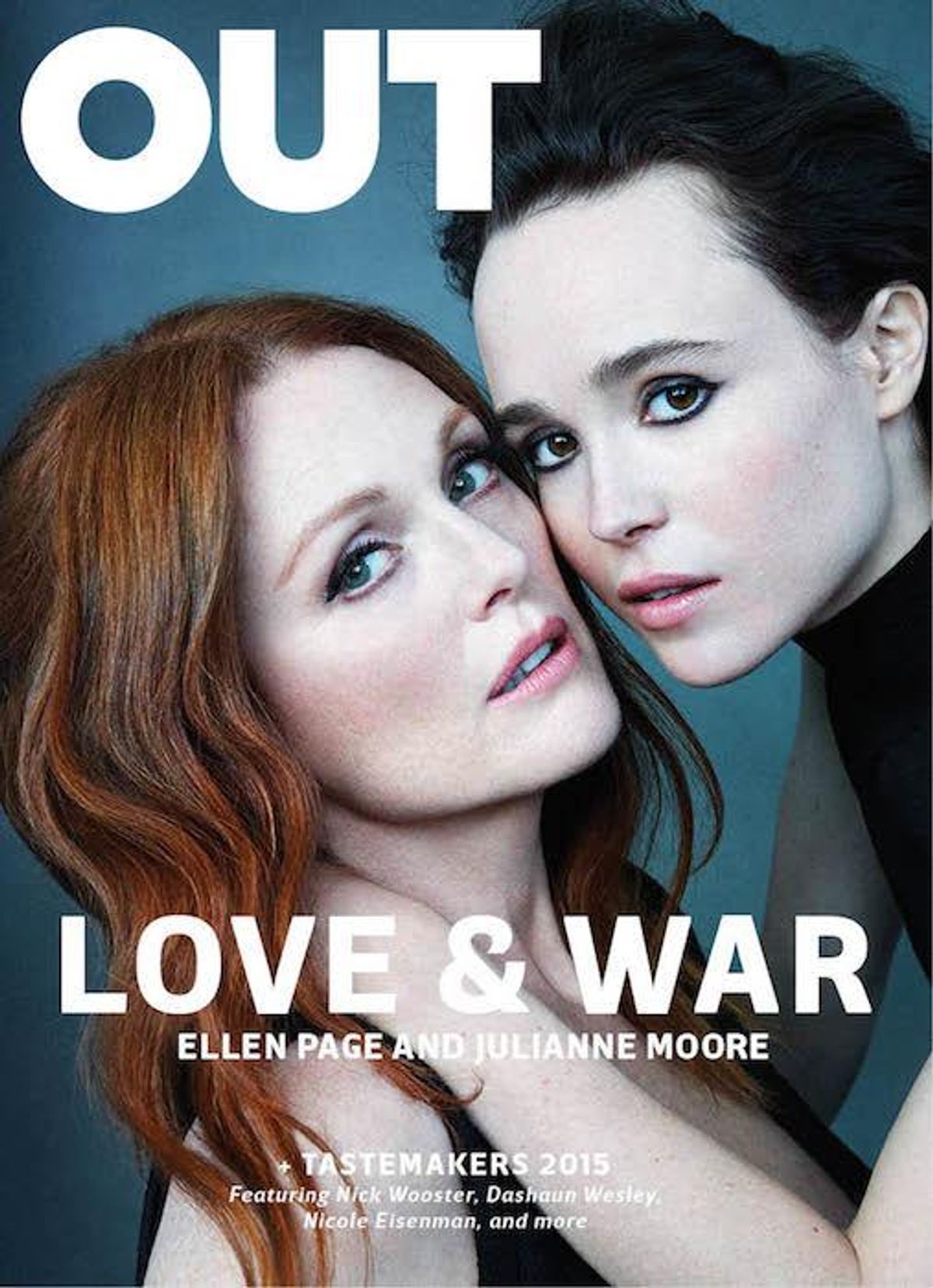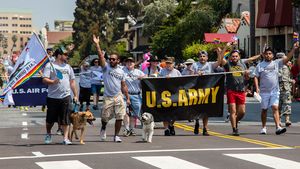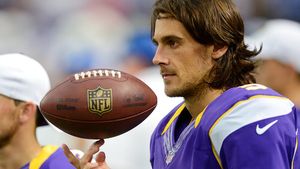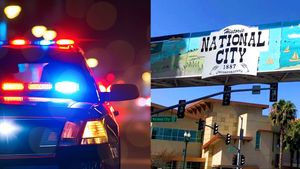Photography by Ruven Afanador. Styling by Grant Woolhead. Market Editor: Michael Cook. Hair: Ted Gibson at Jed Root. Makeup: Matin at Ray Brown Productions
Ellen Page and Julianne Moore were both in New York City on June 26, when the U.S. Supreme Court ruled in favor of marriage equality. Page was shooting a movie, and she remembers a lot of "really exciting, positive energy" that day, not least because she was driving around with a colleague who's also gay. High on Moore's list of recollections were the traffic-stopping takeover of Pride weekend and a post-ruling statement from President Barack Obama. "He essentially said, 'When we are all more equal, we are all more free,' and it was a really beautiful thing to say," Moore says. "Because we were all holding our breath, thinking, Come on, this has got to work. If it doesn't work, what does it say about us as a nation? You don't want to carry that kind of shame anymore -- it's absurd. Someone, maybe on my Twitter feed, was talking about all the people who were railing in the Southern states, like, 'I will not allow this to happen.' And that someone just said, 'Give it up. It's over. It's done.' I think there was a sense of relief, finally, that we did the right thing, as a nation and as a culture."
Of course, leaps and bounds were preceded by smaller steps, and in the march toward marriage equality, one of those steps was the 2006 case of Laurel Hester and Stacie Andree, lesbian partners whom Moore and Page, respectively, bring to life in this month's Freeheld. A narrative, feature-length adaptation of the 2007 Oscar-winning documentary short, Freeheld turns down the noise, focusing on a quiet, simple couple, and putting micro faces to a macro cause. Hester died in 2006 at the age of 49. She was a 23-year veteran of New Jersey's Ocean County police force when she was diagnosed with terminal lung cancer. She wasn't permitted to pass her pension benefits on to Andree, her legal domestic partner. At the time, counties in New Jersey had the option to extend benefits to domestic partners; however, for reasons that seem indisputably tied to antigay discrimination, Hester and Andree weren't afforded that right by local freeholders. Their battle for justice eventually vaulted them into the national spotlight.
SLIDESHOW | Ellen Page & Julianne Moore
"For me, lots of stuff surfaced [playing Stacie]," says Page, who came out last year during a moving, yet authoritative, speech she gave at a Human Rights Campaign conference. "Recreating a sort of closeted relationship in a film caused some stuff to surface, for sure. And then there's [the matter] of speaking up or potentially owning an identity that I think does require a responsibility of trying to help move things forward. For Stacie, it was more complicated, because her being fully involved in that activism meant accepting that the love of her life was going to die, and that was a lot of the complication for her. I could not imagine something worse. But when she finally managed, in some way, to accept that idea, I think she could fully give herself to the activist part of it all."
Page, 28, also serves as a producer on Freeheld, and she's been attached to the project since she was 21, not long after the release of her breakout hit, Juno. She was involved before Moore, before gay screenwriter Ron Nyswaner (Philadelphia), and before director Peter Sollett (Raising Victor Vargas, Nick and Norah's Infinite Playlist).
"I remember thinking, Ellen, how in God's name could you make this film and not be out?" Page says, a bashful smirk flitting across her face. "What's interesting to me is how long it took to make the movie -- for it to finally come together -- and how my internal progression toward coming out was naturally in line with it. Stacie and Laurel's story is incredibly inspiring and did take a lot of courage, particularly in a time of such unimaginable difficulty. It really did make me go, Dude, just tell people you're gay. Just get over yourself, honestly, and support those who are not as privileged. It's like, You have fucking privilege, so do something with it."
Sollett -- who'd previously depicted queer characters with great, yet subtle, inclusiveness in 2008's Nick and Norah's Infinite Playlist -- also devoted a chunk of his life to Freeheld. He's been on board for roughly five years. Page came out to Sollett during that time, and what eventually followed for the filmmaker was a daily dose of revelation.
"I had a privileged position of working with her every day, and having an ongoing conversation with her about how [the work] was affecting her emotionally," Sollett says. " 'Was it liberating? Was it intimidating? Are you feeling empowered?' I don't think there will be another experience in my creative life where I get to share that with someone. A week or two into production, she told me it was one of the best experiences she'd ever had making a film. I think what she does in the movie feels like a breakthrough from an artist we've come to know and expect certain things from. Not only is she doing something new as an out woman playing an out woman in a mainstream Hollywood film, she's giving us something that feels entirely fresh -- like finding a room in your house that you didn't know was there, or discovering another verse to your favorite song."
Moore, too, was impressed with the way Page tackled the role. "It was interesting for me, because Ellen had just so recently come out [when we started filming]," she says. "And this is going to sound silly, and hopefully not hurtful on my part, but I don't think I was aware of how painful it is to be closeted. I have the advantage of being a person who's never had to hide my sexuality, so I asked her a lot of questions -- frank questions -- about what that feels like. She said she felt discomfort simply wearing all these dresses, and it was all very eye-opening for me. She was so unprotective [of herself] -- I was very touched by that. It definitely made me more sensitive to the nuances of our movie."

Moore's candor is refreshing, but also surprising. Aside from having a handful of lesbian roles on her vastly diverse resume (see The Kids Are All Right and The Hours), Moore, 54, has worked with some of cinema's great gay auteurs, like Todd Haynes and Gus Van Sant. More recently, she's teamed with queer pioneers like Lisa Cholodenko and the duo of Wash Westmoreland and the late Richard Glatzer, who co-directed her in her Oscar-winning turn in Still Alice. Surely somewhere along the line she heard other tales of closeted torment? "No," she says. "Because everyone I knew was out -- or is out. The last person I was friends with who was closeted was a really close friend in high school, and she came out in college. But even then, it seemed very matter-of-fact -- she was out. It was nothing like this."
Moore may never have had to console a queer friend in precisely this way, but her assessment only reinforces the popular conception that bigotry is not part of her DNA. Pressed for an early childhood memory that might have fostered this, Moore -- who was raised very liberal in a military family that traveled often -- recalls an experience at an elementary school in Lincoln, Neb. One wing of the school, she says, was reserved for kids with intellectual disabilities, and the other was not, but everyone got to play at recess together, integrated. "When you're 9 or 10 years old, kids who are different are scary," she says. "But because we all played together, it just reformed my whole way of thinking. That's why segregation of any kind is bad -- it allows you to feel different and distanced. If you're not exposed to people and things, and if they're not proximate, they feel other."
For Page, collaborating with her co-star began with intimidation. "I was really nervous," she says, turning to a smiling Moore as they take a break from their photo shoot. "That was the first thing. When we were in pre-production, we didn't have that much time [to prepare], and I think that was probably the most nervous I've ever been -- when you came." But nerves were soon displaced by a natural and necessary camaraderie. Rather than a supremely Method actress (which Page assumed she was dealing with when she received preparatory, brainstormy texts from her co-star while meeting with the real Stacie Andree), Moore turned out to be a comfort, even a goof, prone to singing "Peanut Butter Jelly Time" on set. She was also totally game for Page's running gag that Moore is, in fact, a lesbian, given, among other things, her penchant for Birkenstocks. In an aside that has both women exchanging inside-joke grins, Page explains that Moore, for one reason or another, repeatedly brought up her all-time favorite children's book, Baby Island, which, to Page's discovery and Moore's surprise, doesn't center around a straight couple, as Moore had remembered, but two females. As a gift, Moore dug up the original copy from her childhood, with her name in it, and gave it to Page. "It's truly one of the sweetest gifts I've ever been given," Page says.
A standout scene in Freeheld is Laurel and Stacie's domestic partnership ceremony, which Sollett claims is the first of its kind in a narrative film (thanks to recent developments, he hopes it may also be the last). Admittedly, part of the lingering effect of the movie is that Laurel and Stacie's union, a wholly unglamorous affair in which the pantsuited women enter an anonymous hall and sign a piece of paper, feels both new and archaic on screen. In a span of 10 short years, it's indeed hard to think of another scene quite like this, and yet it seems quaint, given that in New Jersey, and now across the entire country, LGBT couples can skip town hall and head straight for the altar. But was Laurel Hester truly the Jim Obergefell of her time?
Hester and Andree never wanted to be poster girls; they merely wanted 11th-hour rights for each other, and as both Moore and Sollett say, as if the phrase was simply in the air on set, "this story is the ultimate example of the personal becoming the political." But at least one man who saw larger potential for Hester's struggle was Steven Goldstein, the founder of Garden State Equality, who helped launch the case into the public consciousness, while furthering his own goals of legalizing same-sex marriage in the state (in Freeheld, he's played by Steve Carell). Regarding the historical and pivotal weight of the drama at Freeheld's center, Goldstein is without doubt.
"The Laurel Hester case was the turning point in our fight for marriage equality in New Jersey," Goldstein says. "In 2006, a few months after the case, the New Jersey Supreme Court ruled for civil unions -- just short of marriage equality. After that decision, I asked a source familiar with the New Jersey Supreme Court whether the court had been watching coverage of the Laurel Hester saga. The source said that without Laurel, they wouldn't have decided for civil unions. In the beginning, both Laurel and Stacie resented that I viewed their situation as the big story that would capture New Jersey's heart to help us win. I think they took it as my not caring about them. But I cared about them deeply. Of course I 'used' their case, if that's how you want to put it. That's how you win social justice."
SLIDESHOW | Ellen Page & Julianne Moore
Goldstein left Garden State Equality behind in 2013, when New Jersey finally legalized same-sex marriage. He's now an associate professor of law and political science at Rutgers in Newark, and looks forward to "a comprehensive federal law to provide sweeping equality in all walks of life to LGBT people in all 50 states, especially to protect our transgender sisters and brothers."
Moore, meanwhile, has more immediate hopes for the future. "You know what would be really nice for this movie?" she says. "I would really like it to be a big, mainstream hit, because I feel like it's an important time in our culture. In the entertainment business, some people say we can effect change. I don't know that we can effect change, but I do know that we reflect it. When there's a Supreme Court judgment, generally, it's because popular opinion has already changed. A majority of people in this country were in favor of marriage equality, and the Supreme Court made that ruling. And look! Suddenly, here is this movie that sort of reflects that back. So we're ready as a culture to say, 'Here. Look. Look how far we've come, and look what we've done.' "
Like This Story? Subscribe today!


























































































Did 'The White Lotus' waste Lisa's acting debut?